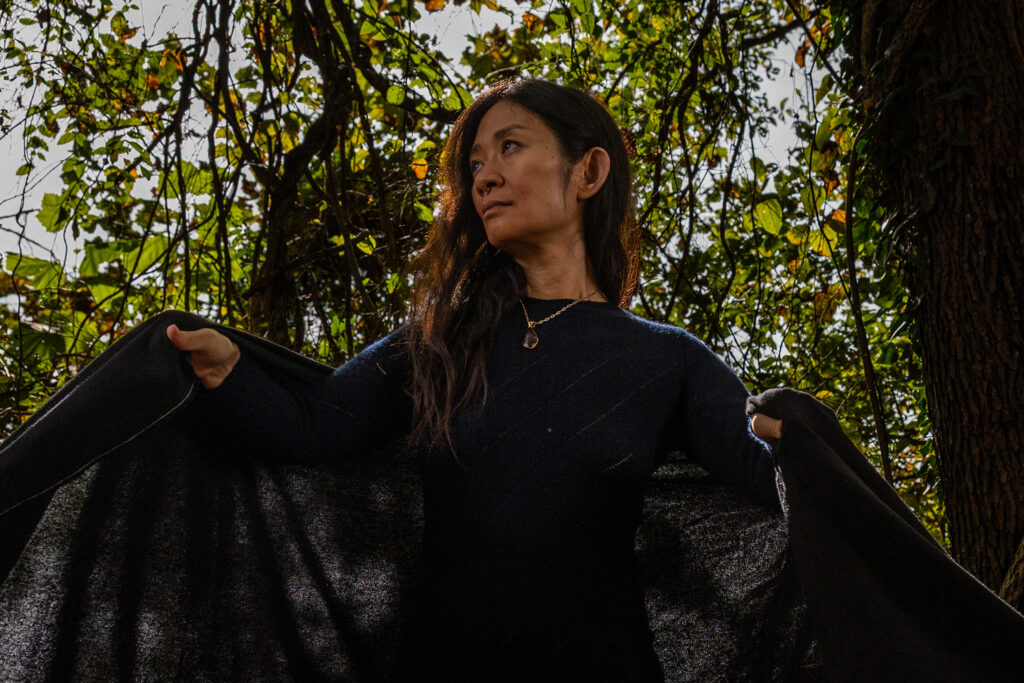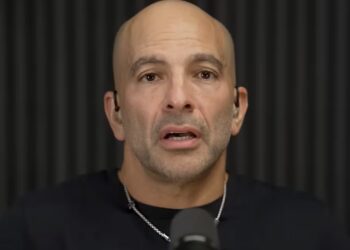Chloé Zhao suggested we go for a walk this morning, seeing as it is unseasonably warm for mid-October. As she forges ahead into a wooded area in Virginia, leaves crunching beneath her footsteps, it becomes clear this is more of a gentle hike. But the incline doesn’t seem to bother her. She keeps an eye out for the baby deer she saw around here yesterday, when she stepped out of promotional events at the Salamander Resort and Spa to clear her head.
The Oscar-winning director (“Nomadland”) has been purposeful about maintaining a calm exterior while touring film festivals with “Hamnet,” a heart-wrenching drama destined for top spots in critics’ year-end lists. She attended the Middleburg Film Festival a month after the title played at the Toronto International Film Festival, where it won the coveted audience award — a reliable predictor for Academy Awards best-picture nominees.
Moments before the Toronto premiere of her movie, Zhao led the audience in a short breathing exercise. She asked everyone to observe their environment and the people seated next to them, to shut their eyes and take three deep breaths in unison. Some crowd members chuckled in discomfort, surprised by the unconventional request, but they eventually quieted as Zhao’s smooth, steady voice lulled them into acceptance.
Looking back on the premiere, she says she wanted “to honor how precious it is that we were here together to share a story. The world can be quite lonesome, so to just be here with each other — I just wanted us to remember, ‘This is happening.’ It’s really simple, the intention.”
“Hamnet” isn’t really about William Shakespeare. Zhao probably wouldn’t have signed on as director if it had been. Though the playwright figures into the overall narrative, a fictional imagining of how extraordinary love and devastating loss inspired the creation of his influential tragedy “Hamlet” (a name that was historically interchangeable with Hamnet), it is Shakespeare’s wife who takes center stage.
Viewers are immediately introduced to Agnes (Jessie Buckley), pronounced “Ann-yis,” the name used to refer to the real Anne Hathaway in legal documents. Agnes falls passionately in love with Will (Paul Mescal), her brothers’ Latin tutor, and marries him against their families’ wishes after getting pregnant. They have three children — a daughter, Susanna (Bodhi Rae Breathnach), and twins Hamnet (Jacobi Jupe) and Judith (Olivia Lynes) — but lose 11-year-old Hamnet to the bubonic plague. Agnes becomes a shell of herself, sequestered in sorrow at their Stratford-upon-Avon home. Will spends most of his time away in London, advancing his theater career.
By her own admission, Zhao isn’t much of a Shakespeare connoisseur. She says the familial drama is what inspired her to adapt “Hamnet,” the critically acclaimed 2020 novel by Northern Irish writer Maggie O’Farrell (who co-wrote the screenplay). Zhao was intrigued by the torrid lovers, who are initially drawn to each other’s differences but end up drifting apart for that very reason. She identified with Will’s impulse to channel his pain into creativity and challenged herself to better understand Agnes, a protective mother who wears her agony like mourning clothes.
“I’m much more comfortable in his character than I am in hers,” Zhao says. “Her character doesn’t exist in my previous films. Cersei in ‘Eternals’ was my first attempt to revive this feminine consciousness that I think has been destroyed in our civilization for tens of thousands of years, and that is very suppressed in myself because it doesn’t feel safe to bring out in the world.”
“Hamnet” is the first film Zhao has directed since “Eternals,” a Marvel Studios production, came out in 2021. Her characters, whether transient workers or immortal aliens, are grounded by emotional realism. William Shakespeare and Anne Hathaway might be one of the most famous couples in English history, but Will and Agnes are just two human beings trying to survive their grief.
Cloaked in drapey black fabric, Zhao practically glides through the woods as she describes how making “Hamnet” helped unlock the vulnerabilities she’d long kept hidden. She learned to see parts of herself in both Will and Agnes, in the masculine and feminine qualities they each embodied. Having studied Jungian philosophy and Hindu tantra, a practice nodding to her Asian upbringing, she believes a sense of self is derived from opposing forces living alongside each other.
“The whole story is about existing in the tension between impossible polarities,” she says. “Life and death. To be or not to be. Grief keeps you in the past, but time is pulling you forward.”
Born and partially raised in Beijing, where her father rose to the executive level of a government-owned steel company and her mother worked in a hospital, Zhao moved by herself as a teenager to attend boarding school in England. After four years, she packed her bags and traveled even further west to Los Angeles, where she completed high school before majoring in political science at Mount Holyoke College in Massachusetts. She minored in film studies there and, after working odd jobs, returned to the craft as a graduate film student at New York University.
In her adopted country, Zhao followed her curiosity. She shot her first feature-length film, the 2015 family drama “Songs My Brother Taught Me,” on location at the Pine Ridge Indian Reservation in South Dakota. She cast Lakota descendants and continued to hire non-actors in her breakout western, 2017’s “The Rider” featuring rodeo horseman Brady Jandreau, and her eventual best-picture winner, 2020’s “Nomadland,” for which lead actress Frances McDormand also won an Oscar.
Connecting with real communities enabled Zhao to tell authentic narratives, a hallmark of her films. She worked their surroundings into the storytelling. O’Farrell, whose book was optioned around the time of its publication, says she knew Zhao was “the right person” to adapt “Hamnet” because of how her “characters’ emotions are sublimated into their environments, into the landscapes.”
“If you look at ‘The Rider’ or ‘Nomadland,’ the main characters are people who are almost unable to admit the emotions they are feeling,” O’Farrell says. “So you get Frances McDormand looking at these enormous caverns of mountains and Brady is looking at this long prairie and, as a viewer, you know what they’re feeling.”
Agnes, a free-spirited herbalist, seeks refuge in the lush forests surrounding her family’s farm. She nestles in a tree hollow to give birth to her first child, a comforting space that stands in for the embrace her late mother can no longer provide. Zhao enlisted Polish cinematographer Łukasz Żal (“The Zone of Interest”) to shoot in Wales, where he highlights the contrast between Agnes’s green surroundings and her deep-red gown, which Zhao notes is “the color of a bleeding heart.”
While “Hamnet” strays from Zhao’s pattern of contemporary dramas — not including “Eternals,” which tends to be the outlier — she still turned to her actors to achieve emotional truthfulness. Buckley introduced her to dreamwork, which involved drawing inspiration from the subconscious. The cast dived deep during the roughly two-month shoot, excavating buried pain to achieve their characters’ devastation. They broke tension on set by dancing freestyle to pop music such as Rihanna’s “We Found Love,” which soundtracked an impromptu dance party on one of the final days of shooting. It was especially important to Zhao that the adults let loose, as “children are closer to our animal self — they experience something, they shake it off,” she says. “But adults tend to attach narratives to their feelings more.”
And yes, she knows how bohemian it all sounds.
“Talking about my film set makes it sound like this very ethereal thing,” Zhao says. “I think because we know there is gentleness and tenderness around, we can go really hard and … sustain that level of emotion and energy for eight hours. Sometimes, the births and deaths were back to back.”
Buckley delivers the performance of a career in “Hamnet,” which requires her to anchor two birthing scenes and one when she loses her child. Her screams emanate from the base of her chest, each one a remarkable release. Agnes mourns the absence of her mother, who died when Agnes was young, while bringing her twins into the world. After she awakens one morning to find Hamnet dead, her worst nightmare realized, her guttural wails bemoan the limits of her power.
To tap into this heightened sensitivity, Zhao says, “you have to be a snail without a shell.” She and her crew members protected Buckley as she performed in such a vulnerable state, likening their role to warriors looking out for a shaman who connects with the spirit world.
“When Jessie is acting, when Paul is acting, when the children are acting, we are protecting them,” she says. “We are the masculine structure around them. The makeup artist, the grip, the production assistant, the sound person, everyone knows the importance of holding that temple safe.”
Making “Hamnet” forced Zhao to face her own unhealed trauma. She alluded to a difficult upbringing while introducing the film in Toronto and does so again while meandering in the Virginia forest; her parents divorced when she was a teenager, and her father remarried the Chinese comedic actress Song Dandan. But when Zhao refers to suffering from “a big mother wound,” which she describes as “our deepest wound because it’s our connection to where we come from,” she doesn’t mean it on a personal level. All of society is hurting.
“We have a big mother wound as a species,” she says. “That consciousness is coming through. We know we’re in danger of spinning out without that connection. I definitely thought I was ready to bring my inner Agnes forward. So was Jessie, in different ways. We were ready to dive in.”
This didn’t involve many verbal dissections of Agnes’s motivations, as Zhao has observed that “most of the actors I work with don’t really like to … intellectualize too much.” Instead, she encouraged somatic rehearsals, which involved body movement work and tantric polarity exercises. By guiding the cast through breath work, she helped them assess the balances of their “masculine and feminine energy, yin and yang, Shiva and Shakti, whatever name you want to give it,” she says. “The idea is to explore Paul and Jessie’s extreme masculine polarity and extreme feminine polarity.”
While on set, the director made a conscious effort to lead with vulnerability. “I think sometimes as leaders … we tend to lean heavily on logos, upon rationality and reason, and then be quite afraid of mystery and the unknown,” she says. Just as she took care of her actors, they helped her tap into “that more feminine leader space” by allowing her to “surrender to the moment.” She trusted her intuition to steer her throughout the storytelling process, even if it meant defying plans.
Mescal describes Zhao as “a definitive leader … in a way that I’ve never really come across.”
“Directors have to be in charge of the ship. They have to be the person driving the car,” he says. “She does that, but sometimes she leans on you. It sets up a dynamic of actual intimacy between us on camera — not just with me and Jessie, but with me and Chloé. You want to look after her as a person, and that translates into the work because you have a human form of connection.”
Zhao was approached to make “Hamnet” by producers including Liza Marshall, who secured the film rights; Pippa Harris and her producing partner Sam Mendes; and Steven Spielberg, who joined under his Amblin Entertainment banner. (Nicolas Gonda, a close collaborator of Zhao’s, rounds out the producer credits.) O’Farrell reiterates that she was “thrilled straight away” by the artistic decision.
“I’d seen all her films, and I knew that she was never going to be a person who was going to make a conventional costumey costume drama,” the novelist continues. “I never wanted any screen adaptation of ‘Hamnet’ to be that. I also knew that … she comes from a background or culture that isn’t necessarily idolatrous of Shakespeare. That was a real strength as well, because I didn’t want any director to make it a film about just him. I wanted it to be about all of them.”
The filmmaker isn’t a complete Shakespeare novice; she knows “Macbeth” pretty well, though she laughs while sharing that her previous interest in “Hamlet” basically boiled down to “The Lion King.” Reading and adapting O’Farrell’s novel transformed her appreciation of the tragedy. Zhao had “always thought of it as a revenge story,” she says, but imagining the void Will tries to fill after Hamnet’s death led her to consider the Danish prince’s journey as one of acceptance.
“‘The rest is silence’ is surrender,” Zhao explains, referring to Hamlet’s final words in the play. “That surrender comes from an understanding that all living things must die, passing through nature to eternity. It’s a play about surrendering to life, [however] this life is designed for you.”
While O’Farrell jumps back and forth in the book between Agnes and Will’s budding romance and their grieving process years later, “Hamnet” as a film unfolds chronologically. “Flashing back that much is going to kill the momentum,” Zhao says. She and O’Farrell collaborated on the screenplay at a distance, Zhao from the Los Angeles area and O’Farrell from her home in Scotland.
“This is very much a script that was forged in the crucible of voice notes,” O’Farrell says. “I would wake up in the morning and switch on my phone and there would be this, ‘Ding ding ding ding!’ I’d think, ‘Oh, okay, Chloé has been busy overnight.’ Sometimes there would be 12, 13 voice notes for me to listen to. The shortest ones could be 20 seconds. The longest one was 58 minutes.”
O’Farrell, who works through storytelling obstacles with pen and paper in hand, was fascinated by Zhao’s more extemporaneous approach. The director talks through issues in real time and embraces feedback when offered; she is sure of her own thoughts but recognizes that they aren’t the only ones that matter. When O’Farrell swung by set on one of the days they shot at the stunning re-creation of the Globe Theatre, she observed Zhao “tiptoeing around very quietly.”
“I’ve been on other film sets before, and the director is often a large presence,” O’Farrell says. “Chloé isn’t. She’s like a cat. … You see her weaving through the actors and she talks in a very, very low voice, which other people don’t always hear. She is very present, but almost invisible.”
In an industry that places auteurs on a pedestal, Zhao acknowledges filmmaking as a collaborative craft. She says she could not have made “Hamnet” without earning the trust of O’Farrell, her cast and all the crew members who held her emotions while she held theirs in return. She pauses as she returns to the edge of the woods, only a field standing between her and the rest of the festival. Leaning down to remove her Blundstone boots so she can walk barefoot on the grass, she notes that while every project requires sacrifice, “the traumatic experience of making art has been romanticized, and it’s absolutely unnecessary.”
“I’m allowing myself to be taken care of,” she concludes. “The feminine leadership side of me needs to be nurtured as well. Leading from that part helps everyone else feel like they are safe to be in touch with their instincts. I’m proud of the inner work I had to do to get to that point.”
The post Close your eyes. Breathe. This is how the year’s most powerful film came to be. appeared first on Washington Post.




